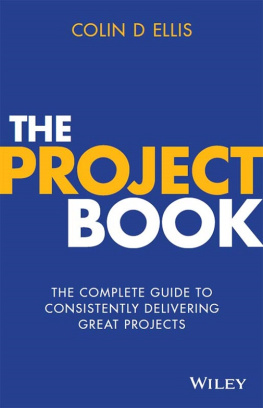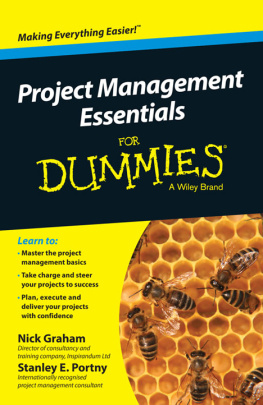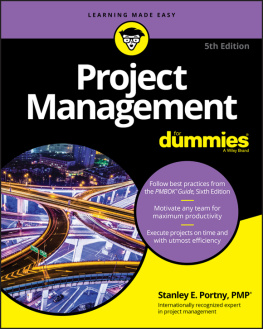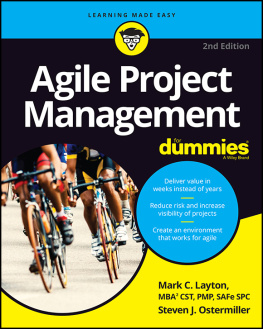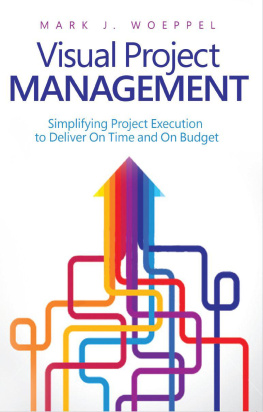
THE PROJECT BOOK
THE COMPLETE GUIDE TO CONSISTENTLY DELIVERING GREAT PROJECTS
COLIN D ELLIS

First published in 2019 by John Wiley & Sons Australia, Ltd 42 McDougall St, Milton Qld 4064
Office also in Melbourne
Typeset in 12pt/14.5pt Adobe Caslon Pro
ISBN: 9780730371410
John Wiley & Sons Australia, Ltd 2019
The moral rights of the author have been asserted

All rights reserved. Except as permitted under the Australian Copyright Act 1968 (for example, a fair dealing for the purposes of study, research, criticism or review), no part of this book may be reproduced, stored in a retrieval system, communicated or transmitted in any form or by any means without prior written permission. All inquiries should be made to the publisher at the address above.
Cover design by Wiley
Disclaimer
The material in this publication is of the nature of general comment only, and does not represent professional advice. It is not intended to provide specific guidance for particular circumstances and it should not be relied on as the basis for any decision to take action or not take action on any matter which it covers. Readers should obtain professional advice where appropriate, before making any such decision. To the maximum extent permitted by law, the author and publisher disclaim all responsibility and liability to any person, arising directly or indirectly from any person taking or not taking action based on the information in this publication.
ABOUT THE AUTHOR
The important thing for you to know about me, before you start reading, is that for the past 20 of my 30 years of permanent employment, my entire world was projects. I moved through the ranks from project manager to program manager to PMO manager to heading up large project departments and sponsoring projects. I did this in three countries the UK, New Zealand and Australia in both public and private sectors.
I had my fair share of successes and failures and was part of some fantastic teams along the way. I never had any desire to work for myself and yet, after attending a conference in 2015 where I felt like I was hearing the same messages about projects Id heard 15 years earlier, I decided that someone had to inject a bit of life, energy and honesty into a profession that had stagnated for far too long.
So here we are.
I now speak at conferences and work with forward-thinking organisations around the world to help them evolve their cultures and create a motivated and energised environment where great work flourishes and targets are met.
Liverpool in the UK was home originally. The eldest of three boys, I wasnt particularly good at school. I just wanted to leave as soon as I could, to earn money to buy records. From the second I started work I loved it. I wanted to be in and around people and be part of something that was consistently new and exciting. So maybe its surprising it took me 10 years to find my way into the project world.
I emigrated with my family to New Zealand in 2007 and had six great years in Wellington before settling in Melbourne, Australia, which is very definitely home now. When not flying to different parts of the globe or researching how to improve individuals and working cultures, I can often be found at home watching my football team, Everton, play in the English Premier League or hanging with family watching our latest comedy obsession.
I sincerely believe that when done well projects can change the world. I wrote this book because I felt like someone had to provide the real (not theoretical) information on how to do this. I hope you find it useful.
Colin Melbourne, 2019
PREFACE
Projects are the lifeblood of organisations. They are used to fix things that are broken, to add to things we already have or build things we dont, to keep organisations relevant, or simply to improve the bottom line. However you look at it, they are absolutely critical. We talk about them all the time and assume, before we even start, that theyll surely be successful. So a quick reality check before we get cracking: usually they wont be. Here are a few recent statistics:
- On average 34 per cent of projects around the world are considered successful, a rise of only 5 per cent in the past 20 years.
- Of the 84 per cent of organisations that said transformation projects were crucial, only 3 per cent said they had completed any successfully.
- Only one in five organisations say they are effective at scaling agile methods for project delivery, with a further 30 per cent indicating they are only slightly effective.
- Only 34 per cent of organisations deliver projects that are likely to achieve customer satisfaction.
These figures dont make great reading (in fact some of them are plain appalling), but in my experience, they do accurately represent the daily experience in most organisations when it comes to discipline and maturity around the way they deliver projects.
Many reasons get wheeled out in reports on why projects fail, yet in reality there are only two: poor project sponsorship and poor project management. This book addresses both of these problems. It gives project managers the information they need to inspire and motivate their people to do great things, and it provides senior managers with a blueprint for what it means to role model public accountability and decision making.
Consulting organisation The Standish Group, in its 2016 Chaos Report, identified the three key success factors for projects as (1) executive sponsorship, (2) emotional maturity and (3) user involvement. In my experience, all play an important part, and all are within the control of the project sponsor and project manager.
Organisations around the world have been throwing money at project management for years now and they still havent seen a return on this investment. In its 2016 Pulse of the Profession report, the Project Management Institute (PMI) noted declines in many of the success factors they track. Even more concerning, the percentage of projects meeting their goals which had been flat for the past four years took a significant dip. To check this trend, organisations [need] to shift their thinking and embrace project management as a strategic competency for success.
For me this is a chicken-or-egg problem. When organisations witness great project sponsorship and project management in action they can recognise it as a strategic competency for success. However, only by putting time and money into developing this competency can it produce truly great results.
Whats it going to take for senior managers to take projects seriously?
We need to invest in lifting the skill sets of people to help organisations evolve and be better at getting things delivered.
Its time for senior managers to put time, effort and real money into developing a delivery capability that is both fit for purpose and capable of evolving as the organisation grows. A capability that recognises what it means to deliver projects successfully every time. And at the heart of that are project sponsors and managers who do the right things at the right time and in the right way.
Without strong leadership from the top, projects are like cheap Post-it notes. Sure, theyll stick at first, but all too soon theyll come unstuck and be found in the bathroom on someones shoe.
Next page
